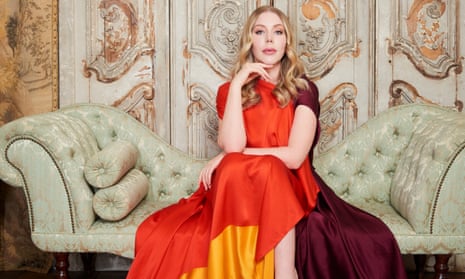Katherine Ryan has named her autobiography The Audacity, a word (she explains) most commonly used to indicate disapproval. “Like, ‘HOW DARE she carry herself with that wicked abundance of self-belief? How AUDACIOUS!’” It is the perfect title. The absolute perfect title for a memoir by a comedian equal parts louche and lurid, famous for her uncompromising attitude, convincing invulnerability and refusal to self-deprecate. Her cover photo, shot when she was nine months pregnant, sees Ryan lucent and blonde in an ice-blue gown trimmed with marabou feathers, holding aloft in her left hand her favourite of her three tiny dogs.
It is these small dogs that greet me at her front door, and an entirely other lady. Instead of TV’s Katherine Ryan, be-lashed and dazzling, a happy cross between Christine Baranski and Taylor Swift, I’m welcomed by real-life Ryan, makeup-less in leggings, immediately offering me a plate of halloumi salad and a selection of milks for my tea. A breast pump sits on the counter beside a bag of golden hair extensions and outside, by the dainty heated swimming pool, her 12-week-old baby Fred sleeps gently in his pram. The atmosphere is one of Californian tranquillity in the London suburbs, only punctured slightly by her description of a man lowering his anus on to a bed post.
I had asked what people think of her and she had answered like this: “There are men who think I’m a dominatrix. And they ask me for a bank account so that they can send me money, or ask me to step on their balls, or to eviscerate them in some way. One man sent a picture of himself lowering himself on to the post of his bed, saying, ‘Please retweet this to humiliate me.’” She gets a lot of that, “because they view me as alpha. The reason why people say women aren’t funny is because it’s alpha to be the only person in the room allowed to speak. And I think we’ve only recently accepted that women can be alpha, too. Which is where the misunderstanding comes from, why people think only men are funny.” She pauses to check on the baby. “And that’s why some men think that I want to stand on their balls.”
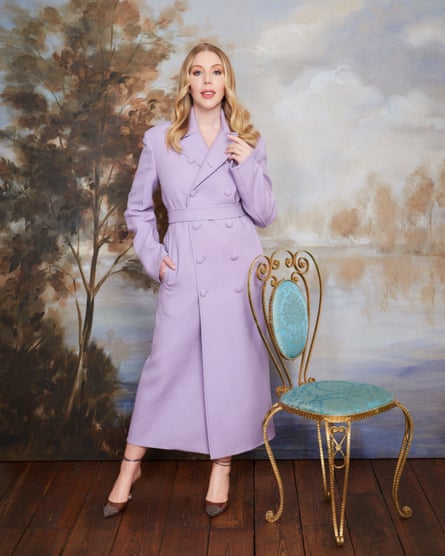
But we are getting ahead of ourselves, because this version of Ryan, the one who hosts panel shows and receives evisceration requests, was shaped by careful accident over 38 years, beginning in Sarnia, a small petrochemical town in Canada. She was restless and popular, and at 19 worked as a waitress with a friend called Jessica. In her book, Ryan calls this chapter “How To Let Your Friend’s Murder Define All Your Relationships”. One day Jessica didn’t turn up to work and soon Ryan heard she’d been killed by her ex-boyfriend. “That’s how it happens,” Ryan’s mum told her that evening. “If you leave them, they sometimes kill you.” “I felt guilty writing about that,” she says, “because when you write your own book, you really centre yourself. She wasn’t my best friend, she wasn’t my sister, but it affected me, and it affected all the young women in our town, too. It was a lesson. When your brain is still growing, the events of your life write on the canvas of who you are. Without even knowing it I learned, ‘If you piss them off, they’ll kill you.’” Years later she’d joke on stage, “Things like, ‘Men are nature’s gun. You’re statistically most likely to be killed by the one in your house. Haha.’ And until recently I didn’t even realise myself, how scared I was.”
A man tiptoes into the room, and wheels the baby away. Not only is her husband Bobby one of the first good men Ryan has dated – in the past she had a habit of going out with, “the kinds of dudes blind dogs bark at” (in standup shows she’d laugh that her dad would meet them and think, “Did I molest her and forget?”) – but he was the actual first man, too, her high school boyfriend. They were reunited in 2018 when she visited Canada to film BBC show Who Do You Think You Are?, and married a year later. They hadn’t seen each other since she’d moved to Toronto for university, where she took a job at Hooters – a sports bar known for its waitresses’ skimpy uniforms – and started to have the time of her life. “I know in retrospect it’s maybe not the most aspirational thing that you can do, because it is positioning yourself as being for decoration, which is not ideal, but I was always a student of what I was doing. I thought it was fascinating to hold that position as a young woman.”
She performed in their bikini pageant and visited the Playboy mansion. “I wanted to exploit that reverence given to delicate innocent youth.” She also wanted bigger tits and started to research plastic surgery. “It was such a specific time in pop culture, wasn’t it? With an interesting kind of feminism. When I was in high school, I certainly knew about plastic surgery and I valued being beautiful. I thought plastic surgery was an aspirational, very Hollywood thing that rich people could do.” While many comedians asked about early idols might namecheck perhaps Monty Python or Richard Pryor, Ryan was a fan of celebrities like Jessica Simpson and Britney Spears. “I thought it was so amazing that they could change the way they looked with science. I had a checklist of surgeries, all part of my plan for becoming a nice girl who’s pretty and tanned. I wanted to alter things, not for any deep dark body dysmorphia. Just… curiosity. I wanted to be feminine, and I wanted to be liked. So I got breast implants. And they were great.”
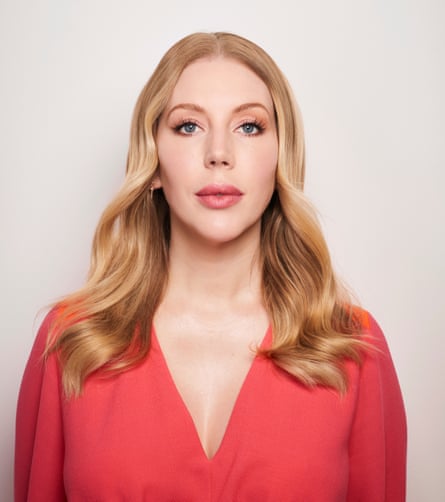
This proves unbelievable for some audiences, unable to align her imperious glamour with her modern feminism. “They don’t like the fact that I’m not hiding it. But I don’t feel that I should be ashamed about it – I think that’s what irks people. I haven’t had as much done as people think, but if that’s fun for them to talk about and there’s a punch line, I don’t mind.” She really doesn’t. “The only thing that makes me a little frustrated is that people don’t know the difference between Botox and filler. That frustrates me from a point of just being a pedant.” Her implants have served her well, but despite this, she says, she’s planning on getting them removed. “The only thing that’s preventing me from getting them out now is finding the time – I was pregnant for 18 months and now I’m breastfeeding. But now I think they were such an emblem of the noughties – they’re like a lower-back tattoo.” Fair.
There are moments during our conversation, while her tiny dogs snore gently on my lap and her large cat (she’s called Sara Pascoe) prowls across the kitchen, that I find myself speechless. Not at what Ryan says so much, but with a sweet and awe-filled shock at how little she cares about what people think of her. Trolls, hecklers, critics, people who reel at the way she paints a picture of single motherhood in pastels and glitter rather than concentrating on exhaustion or shame. We keep coming back to this, the “audacity” of it, and she shrugs. “If I’m entertaining people then I don’t mind what Linda from Leeds wants to write about me in her blog.” I wait. “I think it’s unrealistic to hope that everyone’s going to like you or even that everyone is kind. Many people are unkind, lots of people love to take offence. Lots of people are wrong, and that’s fine with me.”
She grew up far more concerned with being liked than she is now, but the years have thickened her skin, or better, taught her how to prioritise opinions. “My mother would say: ‘If we all liked the same thing we’d all be married to your father.’ But it’s wonderful to be able to do a job where you connect with people. I don’t want a family to waste money on a babysitter and come out to my gig and hate it – I want people to have a nice time. I also want to inspire and empower people, and I think I do that for a lot of women.”
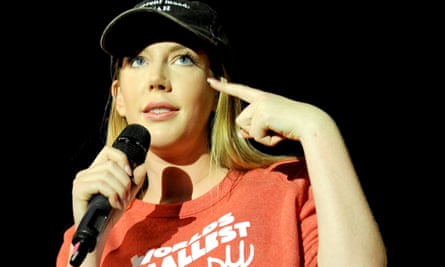
And those she doesn’t? She shrugs again, good luck to them! The not-caring – it’s like a superpower. “Well, I’m trying to teach it to you, but you’ve read the book and it doesn’t seem to have worked!” I promise to read it again, the hardback this time.
The year after winning Miss Hooters Toronto, Ryan hosted the pageant, asking contestants questions like, “Alicia, where do we keep the bin bags?” on their turn around the stage, and silencing hecklers with sharp one-liners. She’d been getting into trouble for her sense of humour – it disrupted the pretty and non-threatening image she’d been cultivating and sometimes in the evenings she’d tell herself off. “I would echo the things that my Hooters manager would say, ‘Why does my brain work this way?’”
Round the corner from the restaurant there was a comedy club and one day she signed up for its amateur night. “Not because I wanted to be a comedian, but because it would be fun for me, my secret. And then in the rest of my life I’d be a good girl, well liked, a good wife. It was a little exorcism of, well… audacity.” When she came off stage after that first set, where she joked about being a “dumb, useless girl”, she realised nothing had made her feel so shit and so alive all at once. She couldn’t wait to do it again.
At 23, when she moved to London with a boyfriend, she got sick. It took months before she was diagnosed with lupus, but once she was prescribed hydroxychloroquine (the anti-malarial drug made famous by Trump) she found a new calmness. “That,” she writes, “was the infancy of the Zen ‘no fucks given’ mantra that I live by happily and manage lupus with today.” And soon after that, she got pregnant. After Violet was born and she split up with her boyfriend, Ryan would joke that they’d wanted a “save the relationship” baby, but ended up with a regular one instead.
“I believe that Violet was the driver of that fateful event,” she grins. “I do believe that you can be a soul somewhere who moves chess pieces together so that you can be born. So I don’t begrudge her that she had to do what she had to do to exist on Earth.” But it did mean that at 24, Ryan was a single parent in a foreign country whose office job did not cover nursery fees. “I thought, ‘What have I done? I’d had a great life, a fun life. I was working at Hooters and making lots of money and going to the Playboy Mansion, then all of a sudden, though I’m lucky enough not to be considered an immigrant, I’m a foreign, destitute, single mother. So I needed to rescue that somehow. And I’m really lucky that I did.”
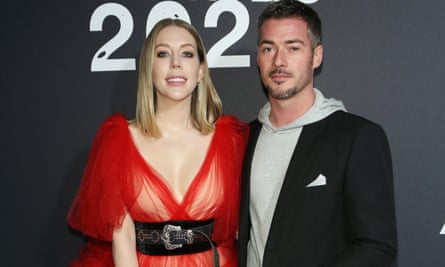
She forced herself to say out loud the elements of her life she was grateful for, and then, “I just slowly moved forward in baby steps until one day I kind of looked around and was like, ‘Oh my gosh, we’re safe.’” Those baby steps were standup gigs, where her fellow female comedians would babysit Violet backstage while she was performing, and then panel shows, and then tours, and later presenting jobs, Netflix specials and a sitcom about a single mother called The Duchess. “But, of course, I can still be cancelled,” she sings.
The most controversial of her stories I think, and the one sure to raise a number of hackles, far more than her “man-hating” jokes, is the story of how she’d potty trained her daughter by 10 months. I can hear parents’ jaws clicking open from here, the sweep of eyes narrowing. “Remember, the absence of training,” she says, her head on one side, “is still training. By putting them in a nappy you’re training them to go in a nappy. People can disagree, I don’t care. But I do care when I have to share a space with a four-year-old in a nappy.” Before she reunited with Bobby, she’d planned to have a second child using donor sperm, but the week after she wrapped filming on The Duchess, in December 2019, she got pregnant. At the 10-week scan, they were told there was no heartbeat. Three weeks passed and she felt, she said, like “a walking tomb”. She’d be telling her body, “You’re having a miscarriage, you need to just let it go.” To which her body would reply, “‘Fuck off, I’m FINE. You need to give me as many gin and tonics as you can and get into a fight with a rapper in front of everyone at the NME Awards.’ I did that. Then I actually fell down the stairs.” She discussed the miscarriage on her podcast, Telling Everybody Everything – “I have felt,” she said, “this collective grief.” One tabloid ran a story about it beside a photo of Ryan and Bobby at Jonathan Ross’s Halloween party, covered in blood. “It looked like we were just leaving the hospital in a terrible state.”
A few months later, in May, she was pregnant again. At a nine-week scan she was ushered into “the Crying Room” and told the baby had a problem with its abdominal wall and at the start of her second trimester, miscarried again. She had decided to be open about her first miscarriage in case it helped other people feel less alone, but the emotional toll – the griefy messages, the vulnerability – meant she was not prepared to do it for a second time. It takes a lot of skill and strength to continue telling jokes through a year like that. She just, she writes, “quietly moved forward”. And then, after 18 months of pregnancy, she had Fred, who vibrates gently in his chair beside her now, legs like ice-cream. She plans to potty train him as soon as possible.
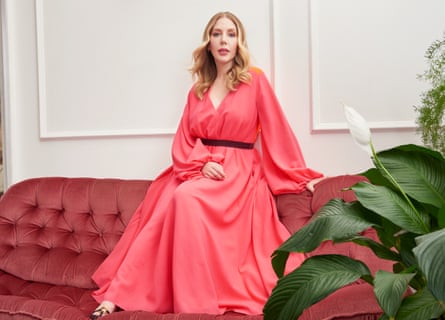
In the past she’s made jokes she regrets. In one of her specials she starts the show by asking everyone on the front row individually whether they’ve raped anyone. “I wouldn’t do that today. Because it can be very triggering for other people in the audience to hear something like that. At the time, I thought that it was a good way of demonstrating that if you haven’t raped anyone, then it’s a ridiculous question. But for Bill Cosby at the time, you weren’t able to ask him that because obviously, he had.” She thinks for a second. “I don’t think I’d even use the word rape now in a crowd setting. I like being provocative. But if that’s a triggering word for people in the audience who’ve been survivors of abuse, I wouldn’t want to use it.”
Ryan’s is an industry swamped in conversations about “cancel culture” – Chris Rock blamed all the “unfunny TV shows” he sees on the fact that “everybody’s scared to make a move”, joining a chorus of voices concerned that cancel culture is killing comedy. To Ryan though, it’s quite simple. “I just started articulating myself more thoughtfully, because if I didn’t, it might be hurtful to people. And when that’s explained to you we evolve as a society. I feel like ‘cancel culture’ has become about hurting people. It’s not even to make things better. I ’m all for taking accountability and giving someone a chance to say, ‘I misspoke.’ But I think there’s a new thirst for exposing people – I even see with my daughter and her friends on TikTok, so worried about being cancelled, that they point the finger first.” She shivers slightly in the heat. “I always articulate myself the best that I can with the knowledge that I have at the time. And then if I have to reassess what I’ve said, or apologise, then I’ll do that.”
The world changes – this is something she is keen to teach the young people in her life. “Violet might look at me and say, ‘Why work at Hooters, that’s not very feminist?’ Well, I was just living in the world that I was in, and it was different. And we didn’t have smartphones, Violet, and this was still acceptable. It’s not like I was misbehaving – that’s what the world was.” She exhales meditatively. “If I was the same person 10 years ago that I am today, that would be horrible. Don’t you think?” Honestly? We could do worse.
Hair by Narad Kutowaroo at Carol Hayes using GHD and Unite Hair; makeup Fiona Eustace using Suqqu and Tom Ford
The Audacity by Katherine Ryan is published by Bling at £20. But it for £17.40 at guardianbookshop.com. She is also touring the UK with Missus (livenation.co.uk)
